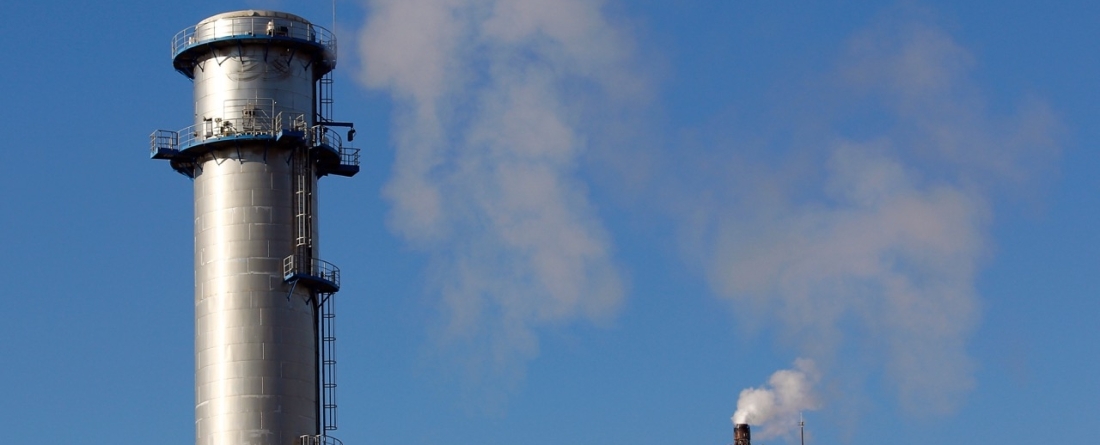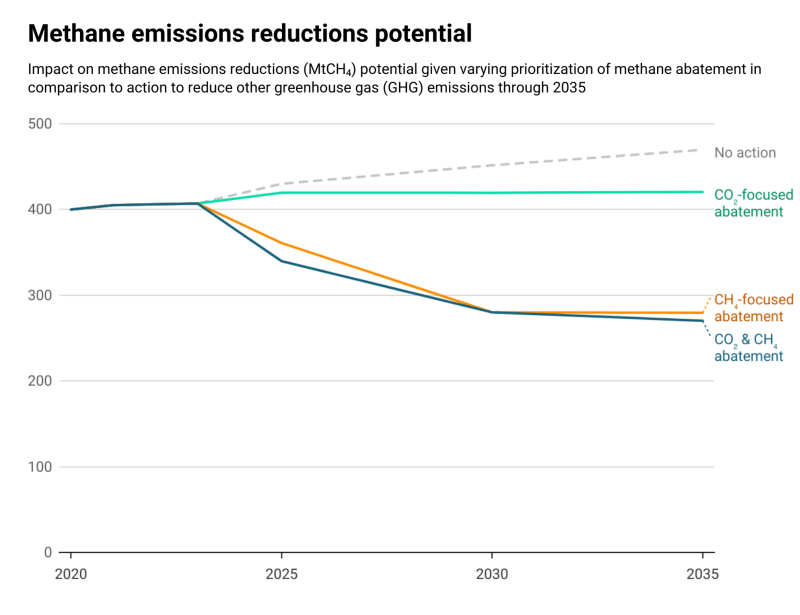
Reducing methane emissions by 30% by 2030 is critical to limiting global temperature rise over the next 20 years—the equivalent of cutting 10 gigatons of carbon dioxide
NOVEMBER 29, 2023 – Reducing methane emissions over the next 12 years—particularly from oil and gas—is the single biggest deployable, practical and affordable mitigation strategy available to reduce climate risk, a new analysis from the Center for Global Sustainability (CGS) at the University of Maryland reveals.
Released days before COP28, this analysis — supported by Bloomberg Philanthropies — demonstrates that methane can make up nearly half of the needed emissions progress (10 of 21 gigatons of CO₂ equivalents) until 2030, however if governments fail to cut methane emissions by 30% by 2030, then the world will reach 1.5°C sooner, experience a more prolonged global temperature overshoot, and increase the risk of tipping point disruptions of sea level rise or oceanic temperatures.
Unlike CO₂ emissions that linger for centuries, methane's 10-year lifespan means that slashing its emissions by 30% by 2030 is the equivalent of cutting 10 gigatons of CO₂ emissions over the next twenty years. This means that the international community can rapidly curb the short-term rate of global temperature warming, and the speed at which temperatures rise matter greatly.
“By tackling methane emissions in the next 12 years we effectively cut 10 gigatons of planet-warming gasses. This is a tremendous opportunity for our planet that cannot be missed,” said Carl Pope, senior advisor to United Nations Secretary-General’s Special Envoy for Climate Ambition and Solutions Mike Bloomberg and former CEO and chairman of the Sierra Club. “Cutting methane pollution from oil and gas is the most affordable and easiest component of keeping 1.5 alive.”
The new study, which integrates previous work, reexamines what cutting methane emissions by 30% over the next decade could do for global temperature rise compared to focusing only on reducing CO₂ and associated greenhouse gasses. The study was primarily on strategies which could help avoid crossing climate change tipping points – ice sheet melt or oceanic currents. It found that even if CO₂ emissions were to steadily decrease and the planet reach net-zero around 2050, over half of the global temperature decrease by 2045 would have come from dedicated methane abatement. Additionally, a 30% reduction in methane emissions over the next 12 years would limit global temperature rise to 0.28°C instead of 0.34°C without dedicated methane abatement.
Furthermore, the analysis found, rapid methane and CO₂ abatement over the next decade can moderate near-term temperature change and deliver longer-term temperature stabilization compared to focusing only on methane or CO₂.
“Our research shows that the maximum and immediate methane abatement is crucial to limiting global temperature increases and achieving global climate goals over the next 15 years,” said Nathan Hultman, Director of CGS and co-author of the report. “For the global community to meet the Global Methane Pledge requires 85% reduction in oil and gas emissions, over 50% reduction in coal methane emissions, and more than 25% reduction in landfill methane emissions.”
Download the full analysis here.
About the Center for Global Sustainability (CGS)
Through world-leading research and policy engagement, the Center for Global Sustainability at the University of Maryland seeks to change the way that governments, businesses, and people see possibilities for ambitious climate action. Founded in 2016 in response to the need for research and thought leadership, analysis, and engagement to support the achievement of global climate goals, its programs advance understanding to support ambitious national and subnational climate strategies, fossil phase-out, energy innovation, finance, and other priorities in the United States, China, Indonesia, India, Brazil, and other major economies. CGS works with a rich community of collaborators around the world. CGS is housed within the University of Maryland School of Public Policy. Learn more at cgs.umd.edu.
###
MEDIA CONTACT:
Andrew Overton
andrew.overton@fgsglobal.com




